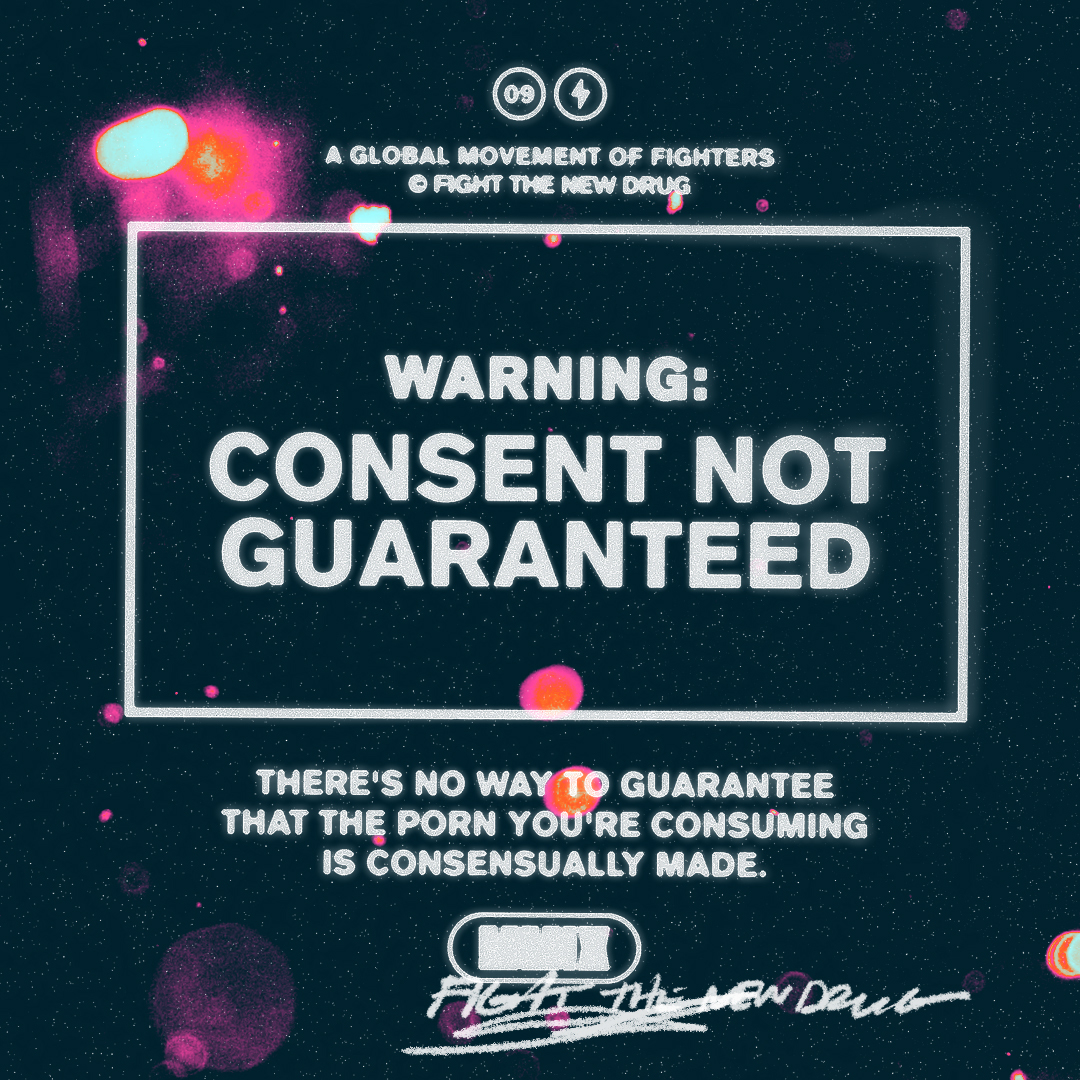Wouldn’t you feel better if you knew that everything you consumed—from your coffee to your clothes—was made ethically, without any exploitation and was 100% fair-trade certified?
Of course you would. So why is porn any different?
It happens all the time. Porn consumers can often justify their habit by believing the XXX material they are watching is legitimate, legal, and free of any exploitation. The problem with this is that there really is no reliable way to tell if what is being watched is free of exploitation, coercion, trafficking, force, or abuse. And even if consent can be guaranteed, that doesn’t cancel out the other harmful impacts porn can have on individuals, relationships, and society.
The worldwide web provides a way to make the click-happy, porn-obsessed culture we live in today be able to consume new explicit content for hours on end, and with the way the porn industry dissipates its content, the amount of material you can watch is virtually endless.
Related: How Porn Can Become An Escalating Behavior
That begs the question: how do you really know if the porn you’re seeing is exploitation-free? Well, you can’t. (But like we said, even if you could, exploitation-free porn isn’t harm-free.)
As porn becomes more normalized, we want to be a source of information pointing out that porn is not harmless.
This isn’t a moral argument. This comes down to you and your personal relationships, and the opportunity to make an informed decision about what will help you indefinitely thrive.
Let’s pretend “exploitation-free” porn exists
In order to explore this idea, for a minute, let’s pretend that exploitation-free porn exists and is readily available everywhere.
Let’s suppose that the consumer started watching pornography, made by people they absolutely knew were creating this content according to their own free will, and that the performers completely understood and agreed to everything that happened before, after, and during the filming.
Now, if the consumer knew for an absolute certainty that this pornography was made free of exploitation, would watching pornography still be harmful?
Even if there was a way to tell that everything you clicked on was exploitation-free, there are still harmful effects pornography leaves on the consumer’s brain and relationships that make porn a public health issue for our society.
Harmful to your perception and expectations of reality
Even the myth of “exploitation-free” porn can change and rewire a consumer’s brain and sexual template.
Did you know that thanks to a process called neuroplasticity, our brains are constantly changing? When we engage in an activity—particularly a pleasurable activity, and particularly if it involves repetition and intense focus—our brains alter themselves so that they’ll be better and more efficient at doing that activity the next time.
But this brain process can also be overwhelmed by what’s referred to as a supernormal stimulus—an exaggerated form of what’s normal. Pornography, for example, can take our brains’ natural stimuli—our desire for intimacy and connection—and give us more quantity, more exaggerated, and more “supernormal” versions of that desire.Hilton D. L., Jr (2013). Pornography addiction - a supranormal stimulus considered in the context of neuroplasticity. Socioaffective neuroscience & psychology, 3, 20767. https://doi.org/10.3402/snp.v3i0.20767Copy Through the neuroplastic process, porn can change what we perceive as normal, warp what we find exciting, and make real intimacy seem less interesting by comparison.Voon, V., et al. (2014). Neural Correlates of Sexual Cue Reactivity in Individuals with and without Compulsive Sexual Behaviors, PLoS ONE, 9(7), e102419. doi:10.1371/journal.pone.0102419Copy
Related: How Porn Can Change The Brain
The consumer may think that they’re just being entertained and aroused by their increasingly extreme and explicit porn, but what their brain is busy doing is changing the connections between their feelings of arousal and whatever’s happening on their screen. Even if what’s happening is violent, degrading, capitalizes on racist stereotypes, and fantasizes nonconsensual scenarios—even if the performers claim to have consented.
These changes in our expectations can have tremendous implications for how we view others and how we view relationships.
Sexual objectification occurs when people perceive others as sex objects, rather than complex human beings deserving of dignity and respect, and is considered by experts to be the “common thread” that connects different forms of sexual violence.Gervais, S. J., & Eagan, S. (2017). Sexual objectification: The common thread connecting myriad forms of sexual violence against women. The American journal of orthopsychiatry, 87(3), 226–232. https://doi.org/10.1037/ort0000257Copy This is especially concerning considering that research shows that when someone is watching porn, they are likely participating in sexual objectification.Cikara, M., Eberhardt, J. L., & Fiske, S. T. (2011). From agents to objects: sexist attitudes and neural responses to sexualized targets. Journal of cognitive neuroscience, 23(3), 540–551. https://doi.org/10.1162/jocn.2010.21497Copy Seabrook, R. C., Ward, L. M., & Giaccardi, S. (2019). Less than human? Media use, objectification of women, and men’s acceptance of sexual aggression. Psychology of Violence, 9(5), 536-545. doi:10.1037/vio0000198Copy
When porn consumers develop habits of objectifying others, it can also harm their partners and relationships.
Related: Why Porn Can Be Difficult To Quit
According to a 2015 study, previous partners’ pornography consumption predicted women’s levels of feeling sexually objectified, higher levels of body shame, and even lead to increased eating disorder symptomatology. The researchers of the study concluded, “…these women reported feeling that their male partner transferred the objectifying treatment of women in pornography onto them.”Tylka, T. L., & Van Diest, A. M. K. (2015). You looking at her “hot” body may not be “cool” for me: Integrating male partners’ pornography use into objectification theory for women. Psychology of Women Quarterly,39, 67–84. http://dx.doi.org/10.1177/0361684314521784Copy
Multiple studies have found that exposure to both violent and nonviolent porn increases aggressive behavior in the consumer and, in rare and extreme cases. To make matters worse, when porn shows victims of violence who seem to get pleasure being hurt—as porn performers are often paid to do—the consumer is fed the message that people like to be treated that way, giving them the sense that it’s okay to act aggressively themselves.
That’s harmful for the consumer and for their victims, no matter what kind of exploitation or lack thereof is happening on screen.
Harmful to relationships
If that wasn’t convincing, let’s set aside the individual and neurological impacts of porn.
Dozens of studies have repeatedly shown that porn consumers tend to have lower relationship satisfaction and lower relationship quality.Wright, P. J., Tokunaga, R. S., Kraus, A., & Klann, E. (2017). Pornography consumption and satisfaction: A meta-analysis. Human Communication Research, 43(3), 315-343. doi: https://doi.org/10.1111/hcre.12108Copy Perry S. L. (2020). Pornography and Relationship Quality: Establishing the Dominant Pattern by Examining Pornography Use and 31 Measures of Relationship Quality in 30 National Surveys. Archives of sexual behavior, 49(4), 1199–1213. https://doi.org/10.1007/s10508-019-01616-7Copy Perry, S. (2017). Does Viewing Pornography Reduce Marital Quality Over Time? Evidence From Longitudinal Data. Archives Of Sexual Behavior, 46(2), 549-559. Doi: 10.1007/S10508-016-0770-YCopy Porn consumers tend to experience more negative communication with their partners, feel less dedicated to their relationships, have a more difficult time making adjustments in their relationships, are less sexually satisfied, and commit more infidelity.Maddox, A. M., Rhoades, G. K., & Markman, H. J. (2011). Viewing sexually-explicit materials alone or together: associations with relationship quality. Archives of sexual behavior, 40(2), 441–448. https://doi.org/10.1007/s10508-009-9585-4Copy
Related: How Porn Can Impact Mental Health and Fuel Loneliness
Research also shows that porn consumers tend to become less committed to their partners,Minarcik, J., Wetterneck, C. T., & Short, M. B. (2016). The Effects Of Sexually Explicit Material Use On Romantic Relationship Dynamics. Journal Of Behavioral Addictions, 5(4) 700-707. Doi: 10.1556/2006.5.2016.078Copy Lambert, N. M., Negash, S., Stillman, T. F., Olmstead, S. B., & Fincham, F. D. (2012). A love that doesn't last: Pornography consumption and weakened commitment to one's romantic partner. Journal of Social and Clinical Psychology, 31(4), 410-438. doi:10.1521/jscp.2012.31.4.410Copy less satisfied in their relationships,Wright, P. J., Tokunaga, R. S., Kraus, A., & Klann, E. (2017). Pornography consumption and satisfaction: A meta-analysis. Human Communication Research, 43(3), 315-343. doi: https://doi.org/10.1111/hcre.12108Copy and more accepting of cheating.Rasmussen, K. (2016). A Historical and Empirical Review of Pornography and Romantic Relationships: Implications for Family Researchers. Journal of Family Theory & Review, 8(2), 173-191. doi: https://doi.org/10.1111/jftr.12141Copy
Reports consistently show that porn consumers are twice as likely to later report experiencing a divorce or breakup—even after controlling for marital happiness, sexual satisfaction, and other relevant factors.Perry, S. L. (2018). Pornography use and marital separation: Evidence from two-wave panel data. Archives of Sexual Behavior, 47(6), 1869-1880. doi:10.1007/s10508-017-1080-8Copy Perry, S. L., & Davis, J. T. (2017). Are pornography users more likely to experience a romantic breakup? Evidence from longitudinal data. Sexuality & Culture, 21(4), 1157-1176. doi:10.1007/s12119-017-9444-8Copy Perry, S. L., & Schleifer, C. (2018). Till porn do us part? A longitudinal examination of pornography use and divorce. 55(3), 284-296. doi:10.1080/00224499.2017.1317709Copy
One study, for example, tracked couples over a six-year period to see what factors influenced the quality of their marriage and their sexual satisfaction. The researchers found that of all the factors considered, porn consumption was the second strongest indicator that a marriage would suffer.
Related: How Porn Can Hurt a Consumer’s Partner
Not only that, but the marriages that were harmed the most were those of individuals who viewed porn the most.Perry, S. (2017). Does Viewing Pornography Reduce Marital Quality Over Time? Evidence From Longitudinal Data. Archives Of Sexual Behavior, 46(2), 549-559. Doi: 10.1007/S10508-016-0770-YCopy
See how porn can be harmful, even in a hypothetical world of “exploitation-free” porn?
“Exploitation free” porn is impossible
This may or may not be surprising, but exploitation-free, ethical porn is a fantasy, just like what’s on-screen in porn videos. Though, too often, the abuse that is shown in porn is not a fantasy—it’s really happening to a real person.
There is no viable guarantee for a consumer to know if what they are watching was created in a legitimate, safe, completely consensual environment. There is no way to tell if the performers on-screen are there on their own will, or if they were forced or coerced into taking part in the film—even consent talks and exit interviews can sometimes be dishonest.
Related: How Porn Can Distort Consumers’ Understanding of Healthy Sex
This sounds extreme, we know, given that there are a number of outspoken and enthusiastic porn performers who share their work and love for the industry all over social media and the internet at large. But the reality is that it can be impossible to distinguish between a willing performer and a coerced performer.
If you don’t believe us—or the many studies and personal accounts—believe this: pornography, no matter how “ethical” you believe it to be, is still harmful, and a public health issue.
No amount of “exploitation-free” porn can erase the facts that porn can negatively impact individuals, relationships, and society.




